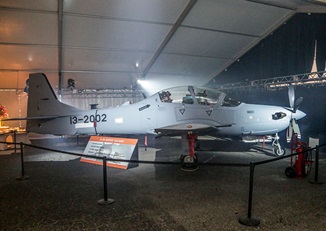
The first of 20 Embraer A-29 Super Tucano turboprops being built to give the Afghan air force light air support capability rolled off the assembly line with a Sept. 25 ceremony in Jacksonville, Florida. Embraer and Sierra Nevada Corp. highlighted that location—along with the 72 local employees hired to assemble and test the aircraft, in a news release that reiterated many of the same points made in recent years as they held off repeated challenges by Beechcraft Corp. seeking to scuttle that deal in favor of its AT-6.
“This delivery represents the birth of an important capability for Afghanistan, and we are very pleased Sierra Nevada Corporation and Embraer were able to deliver the aircraft on time to meet the start of Air Advisor Training at Moody Air Force Base,” said U.S. Air Force Brig. Gen. Eric Fick in the news release.
The ceremony followed the election of Afghan President Ashraf Ghani, who had promised during the campaign to mend souring relations with the United States and sign an agreement that will allow 9,800 American and about 2,000 NATO troops to remain in the war-torn country after Dec. 31. That agreement, long sought by U.S. officials, was signed Sept. 30, and allows American and NATO personnel to train and support Afghan forces, with American Special Operations forces conducting counterterrorism missions in the country that continues to face attacks from Taliban insurgents.
The Super Tucano has been deployed for more than a decade, serving in nine air forces as a light attack and training platform, with 170 aircraft delivered to date. That fleet has logged 230,000 flight hours and 31,000 combat hours, the company noted.
The U.S. Air Force awarded the $427.46 million contract (for a second time) in February 2013, prompting fresh protest from Beechcraft the following month. (The AT-6 makers had succeeded in having a 2011 Super Tucano contract terminated.) Beechcraft officials argued in March 2013 that the Super Tucano deal is overpriced by $125 million, and cited “significant errors” in the evaluation of the competing bids. Beechcraft, in its March 2013 news release, estimated that 1,400 jobs were at risk. Sierra Nevada and Embraer said in the Sept. 25 announcement that the Super Tucano program supports 1,400 jobs among more than 100 U.S. suppliers.



